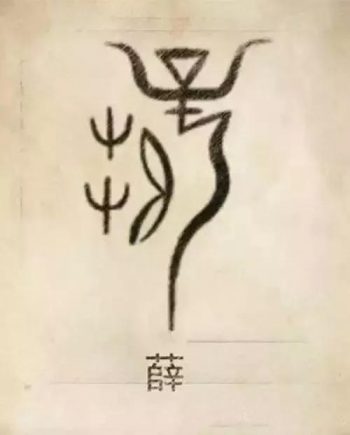The origin of the Xue(xuē) surname can be traced back to ancient times, reflecting the early integration and cultural heritage of the Chinese civilization. The following are main origins of the Xue surname:

Ⅰ、Origins of the Xue Surname
1. The Ancient Roots: Descendants of the Yellow Emperor
The Xue(xuē) surname traces its earliest origins to Xizhong, a descendant of the Yellow Emperor. Xizhong was renowned for his skill in crafting chariots and was appointed as the "Chariot Master" by Yu the Great, the legendary founder of the Xia Dynasty. He was granted the territory of Xue (modern-day Tengzhou, Shandong Province), and his descendants adopted "Xue" as their surname. After the Xue state was conquered by the Qi state during the Spring and Autumn period, its people continued to use the Xue surname.
2. A Legacy of Cultural Continuity
The Xue surname is also related to the Gui surname of Yu Shun. Tian Wen, the Marquis of Mengchang, was enfeoff in the State of Xue, and his descendants took Xue as their surname, becoming another branch of the Xue surname.
3. Ethnic Integration:
During the Northern Wei Dynasty, the Xianbei clan Chigan adopted the Xue surname.
In the Qing Dynasty, Manchu clans such as Xuejia and Xuelu also adopted the Xue surname, further enriching its cultural diversity.
Ⅱ、Historical Figures of the Xue Surname
The Xue surname has been associated with numerous influential figures throughout Chinese history, spanning politics, culture, and science:
1. Military and Political Leaders
Xue Rengui: A renowned general of the Tang Dynasty, famous for his legendary feat of "settling the Tian Shan Mountains with three arrows," symbolizing loyalty and bravery.
Xue Yue: A celebrated anti-Japanese general during World War II, known as the "First Hero of South China" for his military achievements.
2. Luminaries of Literature and Art
Xue Tao: A Tang Dynasty poetess, often compared to literary giants like Yuan Zhen and Bai Juyi. Her collection Jinjiang Ji is celebrated as a masterpiece of female scholarship.
Xue Ji: A Tang Dynasty calligrapher, ranked among the "Four Great Calligraphers of the Early Tang Dynasty," whose work influenced Japanese calligraphy.
3. Modern Pioneers
Xue Muqiao: A founding figure in Chinese economics, instrumental in shaping China's early economic policies and regarded as the "Father of China's Market Economy Theory."
Xue Qikun: A leading scientist in quantum physics, whose groundbreaking research has positioned China at the forefront of global quantum science.
Ⅲ、Cultural Significance
1.Ancestral Halls and Regional Influence
Hedong Hall: Named after the ancestral lands of the Xue clan in Hedong (modern-day Shanxi Province), symbolizing the family's historical roots.
Zhongjian Hall: Commemorates Xue Guangde, a Han Dynasty official known for his fearless remonstrance, embodying the values of loyalty and integrity.
2.Family Teachings and Values
The Xue Family Instructions emphasize principles such as "filial piety, loyalty, frugality, and diligence." For example, the teaching "Brothers should live in harmony and not let disputes over property destroy family bonds" remains influential among Xue families today.
3.Migration Patterns
The Xue surname originated in Shandong, spreading to Henan and Shanxi during the Qin and Han Dynasties. During the Wei, Jin, and Southern Dynasties, many Xue families migrated south to Jiangsu and Zhejiang due to warfare. By the Song and Yuan Dynasties, they had moved further south to Fujian and Guangdong, and during the Ming and Qing Dynasties, they reached Taiwan and Southeast Asia.
Ⅳ、Social Impact
1. Population and Distribution
Today, the Xue surname is one of the most common in China, with approximately 6 million people bearing the name. It is most concentrated in Shandong, Henan, and Jiangsu, with a notable "north-heavy, south-light" distribution pattern.
2. Historical Contributions
Politics: Xue Rengui's military exploits and Xue Yue's anti-Japanese efforts are celebrated in Chinese history.
Science: Xue Qikun's contributions to quantum physics have advanced China's position in global science.
Economics: Xue Muqiao's theories laid the groundwork for China's economic reforms.
3. Cultural Legacy
The "Xue Tao Paper," a Tang Dynasty cultural treasure, and Xue Ji's calligraphy are enduring symbols of Chinese art. Overseas Xue clan associations, such as the Singapore Xue Clan Association, serve as bridges for cultural exchange.
Conclusion
The Xue surname is like a living history book of Chinese civilization, embodying the wisdom of ancient craftsmanship and the spirit of multicultural integration. From Xue Rengui's legendary bravery to Xue Tao's literary brilliance, from Xue Muqiao's economic theories to Xue Qikun's scientific breakthroughs, this surname has consistently played a dynamic role in shaping history. Its family teachings of "filial piety and loyalty" and its migration history of "exploration and resilience" together form the dual genetic code of Xue culture, continuing to influence family traditions and societal values today.